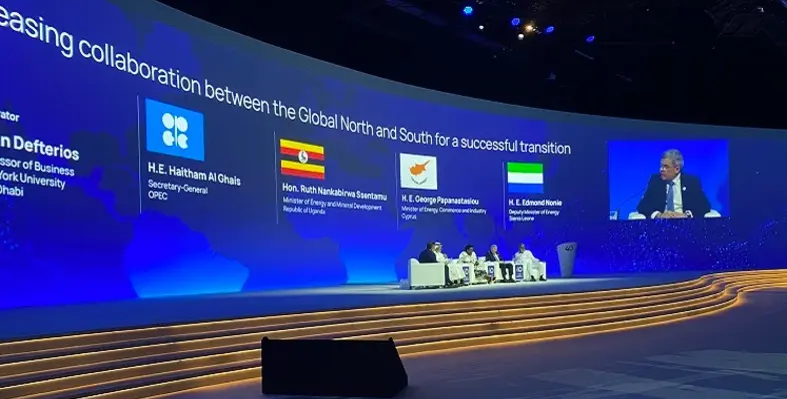During a panel session at recently-concluded ADIPEC 2024 Exhibition & Conference, industry stakeholders discussed ways to increase collaboration between countries in the global South and the global North.
The discussion focused on energy transitions and the role of OPEC in ensuring energy access. Key points included the need for diverse energy sources, with OPEC advocating for all forms of energy, not just renewables. The conversation highlighted energy inequalities, such as Heathrow Airport consuming more energy than Sierra Leone.
The Paris Agreement was emphasised as a reduction of emissions, not a phase-out of fossil fuels. The East Africa pipeline and Uganda's oil projects faced financing challenges but are progressing.
The importance of South-South cooperation and regional collaboration in energy projects was underscored, with examples from Uganda, Cyprus, and Sierra Leone.
His Excellency Haitham Al Ghais, Secretary General of OPEC, explained why fossil fuels will continue to play an important role in the global South.
“We talk about the importance of another factor, which is urbanisation. By 2030 which is less than six years from today, we're going to have over 582 million people, nearly 600 million people, moving into new cities all around the world, again in non OECD developing parts of the world,” he said.
“The Paris Agreement, ladies and gentlemen, is about reduction of emissions. It's not about phasing out or phasing down or keeping the oil under the ground. It's about reducing emissions that includes technology, that includes investing in renewables, investing in all sources of energy.”
“We have the OPEC Fund for International Development, an agency, a sister agency, based in Vienna, that is very active in Africa and other parts of the world in developing and promoting socio economic development projects, energy projects as well as renewable energy projects.”
“We also have the charter of cooperation, which we signed in 2019 which is a platform that is open for oil producers to participate in, whether it's exchange of technologies, exchange of experiences between various member countries and non OPEC producers who are not members of OPEC that can participate in this platform to gain access to the best practices being implemented in our member countries.”
Growing collaboration
Uganda’s Minister of Energy and Mineral Development Ruth Nankabirwa, said, “The East African crude oil pipeline was a negotiated project, and it was a win-win. My president wanted all the oil refined in Uganda, but because we didn't have money to do it by ourselves, we collaborated with investors and we let some of the crude leave the country, while some is refined, which will come with industrialisation.”
Deputy Minister of Energy for Sierra Leone Edmond Nonie, said, “We have big clients in the mining sector who have the capital to pay and have the willingness to pay for lower priced electricity from the grid. So we are embarking on a campaign to connect these mining companies, and once we have these transmission lines out to these companies, we can then do the further, last mile connection to our communities.”
Meanwhile, Cyprus is collaborating with Egypt for energy transmission.
The country’s Minister of Energy, Commerce and Industry, George Papanastasiou, said, “The conversation with my colleagues in Egypt is to utilise the [Egyptian] infrastructure [for export]. Secondly, there are pipelines that cross the eastern Mediterranean, which reach Egypt. And the infrastructure in Egypt, there are two LNG terminals, liquefaction plants in Egypt, which are under-utilised.
“This is possibly the destination in order to reach the markets. Of course, there is the domestic market of Egypt as well, which is very important. We all know that power generation in this country is mostly coming from natural gas. Cyprus is very well positioned, and at the right time in order to support and provide the natural gas and use the infrastructure in order to reach the international markets.”












